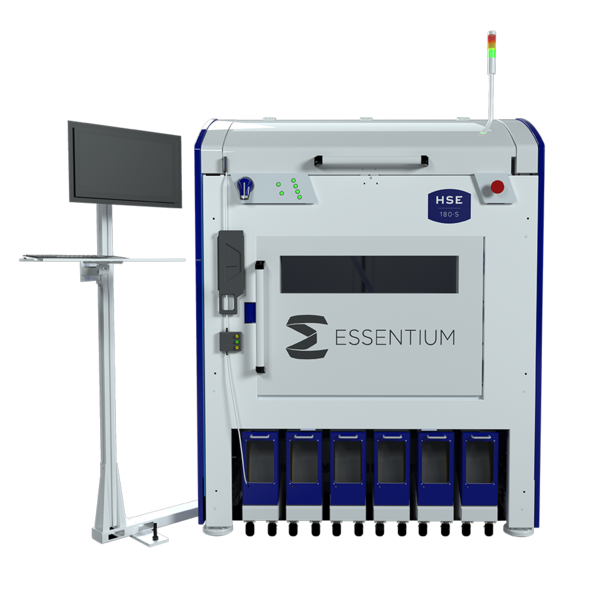![The HSE 180•S 3D printer [Image: Essentium]](https://fabbaloo.com/wp-content/uploads/2020/05/image-asset_img_5eb093de4d4a8.png)
Jabil v. Essentium
Jabil has filed suit against Essentium, alleging theft of trade secrets related to a high-speed 3D printing platform.
The technology in question is hitting the market as Essentium’s HSE 180•S, a system proclaimed to be 10x faster than the next-fasted 3D printer out there.
That’s a sore spot for Jabil, which states that that 10x faster system is actually based on its “TenX” 3D printer, which it had been developing since 2014 — with a team that includes several Jabil employees who went on to work for Essentium.
Jabil Essentium Suit Allegations
The suit, filed at the end of June in Tampa, Florida, directly names three former Jabil employees and one former Jabil contractor in addition to the company itself. All four individuals are credited as Essentium Inc. co-founders; three of the four remain current executives (Greg Ojeda left Essentium in September to found a new company, where he is now the CEO).
Among the top points of the nature of action is one strongly-worded bit that seems to encapsulate much of the basis of the suit:
“Essentium’s HSE printers are, foundationally, outdated iterations of Jabil’s TenX. They are made by former Jabil engineers, from Jabil designs, using components sourced from vendors that Jabil identified and vetted. Indeed, in an audacious nod to the true origin of its printers, Essentium continues to boast in its advertisements that its HSE printers operate at ‘10X’ their competitors’ speed.”
It is a bit… spiteful, we’ll say, should these allegations prove accurate, to talk about “10X faster” systems that stemmed from a project called “TenX”.
Following a lengthy discussion of exactly what and how timelines played out, with each of the named defendants moving from work with Jabil to working with Essentium — including founding Essentium Inc., which expanded the activity from the original company, Essentium Materials LLC — the suit goes on to summarize:
“Defendants’ misconduct is ongoing, willful, and audacious.”
Multiple uses of “audacious” throughout the document are interesting, and make for a bit livelier of a read than most court filings. It’s pretty clear that the team at Jabil were shocked by the alleged behavior, which included ignoring NDAs, signed agreements to honor trade secrets, and other official documents leaving work done at Jabil back at Jabil.
Damages Done
The step-by-step layout shows a well thought-out plan among the individuals named to commercialize the TenX technology. At one point, several of them represented Jabil when the company negotiated with Essentium (Materials) to discuss the potential of partnering or licensing the technology; when that agreement fell through, employment began to change.
Ultimately, Jabil notes that the HSE system heading to the market is damaging to its own TenX project — which had quietly continued these last several years.
We know Jabil primarily as a digital manufacturing solutions provider, and one has been deepening its relationship with 3D printing, including a launch early this year of its Engineered Materials business. I’ve personally visited two of Jabil’s facilities, its Blue Sky center in Silicon Valley and its site in Auburn Hills, and every 3D printer I’ve seen there was from another company, like HP or Ultimaker — the company is very good at guarding its stealth activities, while remaining open about its participation and interest in advanced manufacturing technologies.
The suit makes it very clear that TenX — is? was? — bound for the market itself:
“While Jabil has improved the TenX since Defendants absconded with Jabil’s trade secrets and other confidential information such that the current version of the TenX platform is technically superior to the HSE platform, Essentium nevertheless marketed its stolen HSE platform to the general public before Jabil unveiled TenX. Doing so with an inferior product not only unjustly enriched Defendants, but also interfered with Jabil’s ability to monetize the TenX program and risked damaging Jabil’s reputation by marketing essentially an outdated iteration of Jabil’s TenX.”
All told, the initial claim filed lists 52 allegations against the defendants. The formal counts based on these allegations include:
-
Misappropriation of Trade Secrets In Violation of the Defend Trade Secrets Act
-
Misappropriation of Trade Secrets In Violation of the Florida Uniform Trade Secrets Act
-
Breach of Contract
-
Breach of Fiduciary Duty
-
Breach of Duty of Loyalty
-
Aiding and Abetting Breach of Fiduciary Duty
-
Aiding and Abetting Breach of Duty of Loyalty
-
Tortious Interference
-
Deceptive and Unfair Trade Practices
-
Civil Conspiracy
Jabil ends the claim with a request for a jury trial.
Jabil spokeswoman Michelle Smith shared the following company statement with the Tampa Bay Times:
“Jabil is committed to protecting our intellectual property in our cutting-edge 3D printer innovations. The misappropriation of our confidential designs, vendor relationships, and other trade secrets by these former employees alleged in the lawsuit necessitated Jabil to protect our substantial investment.”
What Does This Say About Essentium?
In simplest terms, this isn’t good for a company we’ve pegged as one to watch.
The technology at the heart of the HSE/TenX process is impressive, bringing necessary improvements in operation to FFF 3D printing to offer a production solution in additive manufacturing. That’s unquestionable.
What is questionable is the ethics at play to get that technology to market.
The Tampa Bay Times broke the news yesterday; the suit was filed on June 28. Basically it’s all still breaking, and we don’t yet know the facts of what actually happened. Obviously we want to believe there’s some base misunderstanding at play, but for the most part as the companies in ques
tion remain understandably tight-lipped, we’re left to sit back and observe.
Via Tampa Bay Times and Law 360











